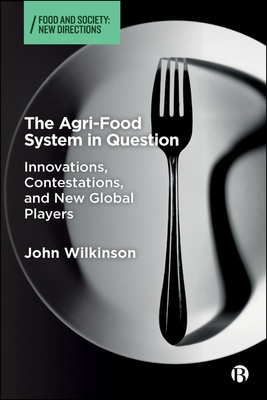Hosted by AUR's Master in Food Studies
Chair: Maria Grazia Quieti
Presenter: Prof. John Wilkinson
Discussant: Dr Francisco Sarmento
 To mitigate climate, biodiversity, and public health crises, the global agrifood system needs radical change. While the Global North remains central to agrifood innovation, new players in the South, especially Brazil and China, will increasingly determine its pace and direction.
To mitigate climate, biodiversity, and public health crises, the global agrifood system needs radical change. While the Global North remains central to agrifood innovation, new players in the South, especially Brazil and China, will increasingly determine its pace and direction.
Prof. John Wilkinson will present his new book and discuss with Dr Francisco Sarmento how a new generation of actors, not associated with traditional agrifood interests, are exploring radical options to address the widely acknowledged crisis of the global food system whether viewed from a health, environment, climate, or animal welfare perspective. Such options have become possible through the convergence of advances in genetics, big data digitalization, and artificial intelligence. On the other hand, since the `80s, social movements, have shown themselves capable of developing an alternative food agenda and also of stopping in their tracks unwanted technological innovations. To add to these uncertainties, global food markets and investments have shifted from North/South to South/East, with China as the pivot of current agrifood restructuring. Economic growth and urbanization is being dominated by states with ample capital but inadequate natural resources to ensure food security and therefore more open to promoting the radical innovations related to climate controlled agriculture and alternative proteins. At the same time, traditional animal protein interests are creating regulatory and legislative barriers to these new food options. The author skillfully explores the way these heterogeneous forces are interacting and, while recognizing that earlier expectations have been dampened, argues that the current innovation wave is showing itself to be too diverse and broad based for simple cooptation by the established global players in agrifood.
 John Wilkinson, (Ph.D. in Sociology, University of Liverpool), is Full Professor at the Rural Federal University of Rio de Janeiro, Brazil. His research focuses on the major transformations in the global agrifood system and their impact for small farming and rural development. He has been a consultant to the OECD, FAO, BID, CEPAL, and the European Commission, together with Ministries and Financial Institutions in Brazil and the Southern Cone, and has also carried out research for international NGOs, OXFAM and ACTIONAID among others.
John Wilkinson, (Ph.D. in Sociology, University of Liverpool), is Full Professor at the Rural Federal University of Rio de Janeiro, Brazil. His research focuses on the major transformations in the global agrifood system and their impact for small farming and rural development. He has been a consultant to the OECD, FAO, BID, CEPAL, and the European Commission, together with Ministries and Financial Institutions in Brazil and the Southern Cone, and has also carried out research for international NGOs, OXFAM and ACTIONAID among others.
His latest book The Agri-Food System in Question has just been published by Bristol University Press. He is the (co)author of several books, From Farming to Biotechnology; Fair Trade: the challenges of transforming globalization; and O Sabor da Origem (The Taste of Origin), and has published many articles in internationally recognized Journals. He has spent periods as an invited researcher to the National Institute for Agricultural Research (INRA) in Paris, to the University of Santa Cruz, California, and to the European Commission. He was the coordinator of the FAO/CFS Report, Biofuels and Food Security in 2013. Wilkinson has published over 150 books, chapters, and articles in English, Portuguese, Spanish, and French. In 2019, he was listed among the top 2% of researchers at Academia.edu. He has over seven thousand citations on Google Scholar.
Dr Francisco Sarmento, agronomist, PhD social Sciences. Former Head of Right to Food in Action Aid International, former FAO representative in Portugal. Presently acting as Senior Territorial Food Systems Officer in FAO. Francisco has more than 25 years of working experience with food systems in several countries in Africa, Asia, Latin America and Europe.
